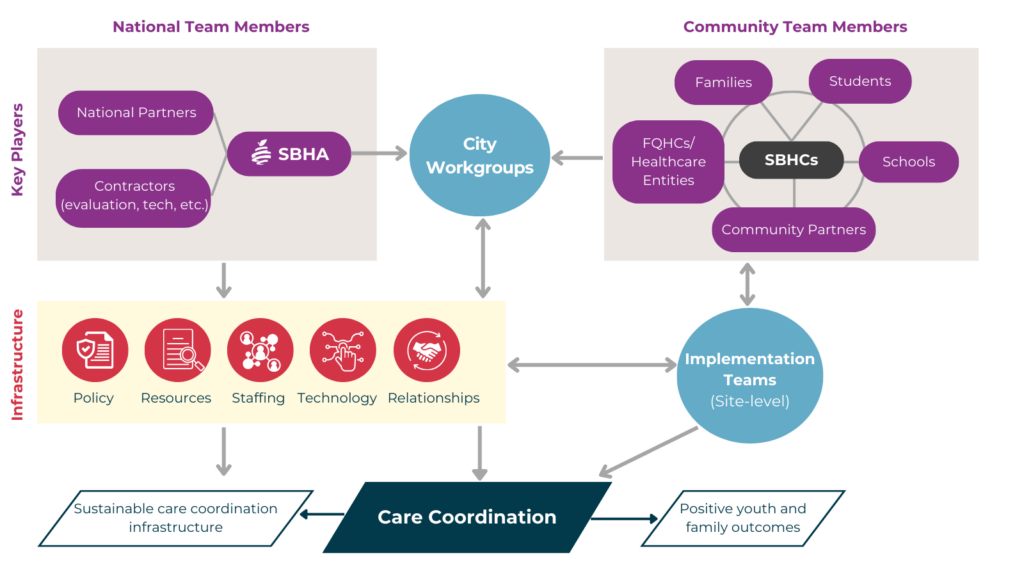School-Based Health Care Coordination Initiative
Initiative Overview
The School-Based Health Care Coordination (SBHCC) Initiative brings a transformative approach to care coordination for students in schools with school-based health centers (SBHCs). School-based health care coordination is the deliberate organization of comprehensive health care activities, including those that address social determinants of health, to advance equitable health outcomes. While the concept of care coordination in SBHCs and schools is not new, this initiative supports dedicated care coordinators to streamline care coordination within SBHCs and among all partners committed to the health and well-being of students. Over four years, the SBHCC initiative will bring 42 care coordinators and comprehensive implementation support to SBHCs in Atlanta, Chicago, Houston, and Miami, while simultaneously building the infrastructure to support sustainable, replicable, and scalable care coordination activities.
The School-Based Health Initiative is a project of the School-Based Health Alliance

Highlights
The School-Based Health Alliance, in partnership with federally qualified health centers in Atlanta, Chicago, Houston, and Miami, officially launched the School-Based Health Care Coordination Initiative, a transformative approach designed to enhance student health and educational outcomes through comprehensive care coordination. The partner health centers include Whitefoord, Inc. (Atlanta), UI Health-Mile Square Health Center (Chicago), Legacy Community Health (Houston), and Jessie Trice Community Health System, Inc. (Miami).
Learn more about case presentations from the care coordinators and discussions grounded in real world application, emphasizing the importance of care coordination capacity and integration within their school-based health centers (SBHCs), schools, and communities.
What is school-based health care coordination?
School-based health care coordination is the deliberate organization of comprehensive healthcare activities, including those that address social determinants of health, to advance equitable health outcomes. It entails sharing information and maintaining communication among all those concerned with a student’s health needs and care. This includes students; parents/guardians; school-based staff, including nurses, social workers, school counselors, school psychologists, and educators; primary, mental, vision, and oral health care providers; and other community-based health care professionals.
Care coordination involves community collaboration and can strengthen the connection between schools and the broader community, creating a network of support for students and families. This network helps young people access comprehensive health services and addresses social factors such as housing, food security, and transportation. It can improve health equity, particularly for students who experience barriers to access because of structural inequities or where they live.
Understand the SBHCC

In each community, FQHCs lead city work groups comprised of community members to help advocate, engage, and inform care coordination within their city. The workgroups will include students, parents/guardians, FQHC staff, SBHC staff, local education agency staff, school leadership, school health staff, and local stakeholders such as pediatric primary care providers, community behavioral health organizations, and other child-serving organizations.
Each care coordinator will work in a school that primarily serves students from families that have low incomes. The care coordinators comprehensive training, mentoring, and coaching throughout the initiative. The care coordinators will help students and parents/guardians navigate the health and education systems, including special education, and the landscape of resources to achieve optimal student health and wellness outcomes. The care coordination position will reduce the fragmentation of coordinating services from existing SBHC staff and collaborate with both the school and SBHC so that students can receive the best quality care.
SBHA also will work to enact policies to sustain the care coordinator role via Medicaid reimbursement.
A School-Based Health Care Coordinator...
| Does | Does Not | |
x | Participate in intensive and ongoing standardized training, coaching, and peer learning to build and maintain school-based health care coordination skills. | |
x | Help students and parents/guardians navigate the health and education systems, including special education, and the landscape of resources to achieve optimal health and wellness outcomes for students. | |
x | Assist in facilitating communication between the student and parents/guardians, school and School-Based Health Center personnel, and external health care providers. | |
x | Help students and parents/guardians address related medical needs, including mental, vision, and oral health; social, developmental, and behavioral needs; and barriers to access (e.g., transportation, finances, language). | |
x | Support students and parents/guardians navigate and better understand the Health Insurance Portability and Accountability Act (HIPAA)/Family Educational Rights and Privacy Act (FERPA), Medicaid, and other health insurance environments in a school setting. | |
x | Support collaboration and sharing information between the school and the School-Based Health Center. | |
x | Perform delegated tasks (e.g., scheduling referrals, consent forms) to ensure that the direct care professionals can work to the fullest extent of their role and license. | |
x | Provide medical and/or clinical care. | |
x | Require clinical training. | |
x | Require an associate or bachelor’s degree but does require a minimum level of lived work experience and training (case management experience a plus). |